FY028: Inquiry Project - Brexit's Impact on Social Healthcare
VerifiedAdded on 2022/08/19
|10
|2763
|8
Report
AI Summary
This report, submitted as part of the FY028 Inquiry Based Learning module at the London School of Science and Technology, investigates the health and social effects of Brexit on the UK. Utilizing secondary data from sources such as BBC News, the World Health Organization, NCBI, and Forbes, the report explores challenges related to health practitioners, patient care, medical facilities, research, food regulation, and health protection. It highlights potential problems stemming from changes in healthcare worker recruitment, funding, and trade relations with the EU. The report also considers solutions, such as negotiation between the UK and the EU, to maintain quality healthcare. The research covers several key areas, including the impact on health practitioners, patient care, expensive medical facilities, medical research, food regulation, and health protection. The report concludes by emphasizing the importance of mutual agreements between the UK and the EU to address the various healthcare challenges brought about by Brexit.
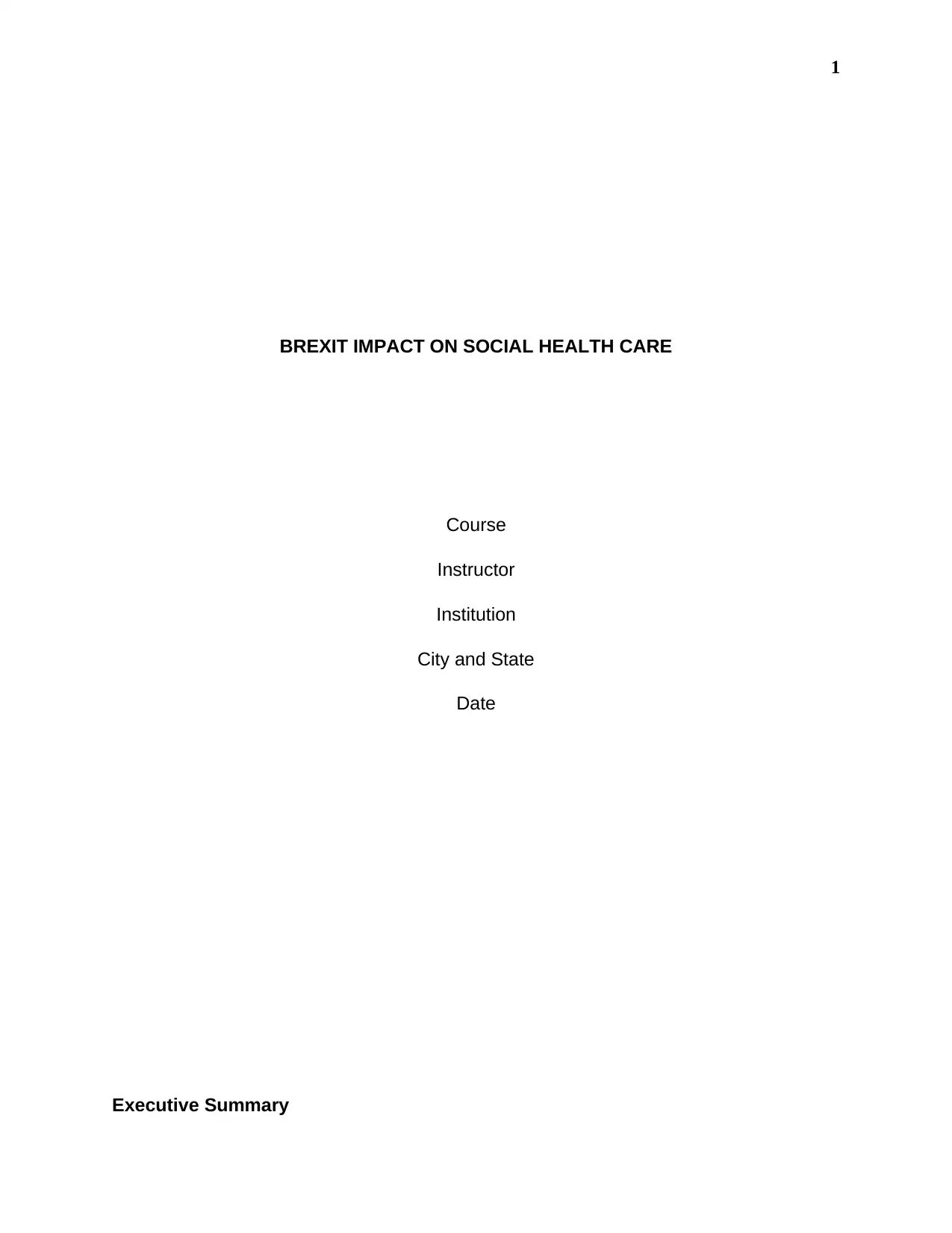
1
BREXIT IMPACT ON SOCIAL HEALTH CARE
Course
Instructor
Institution
City and State
Date
Executive Summary
BREXIT IMPACT ON SOCIAL HEALTH CARE
Course
Instructor
Institution
City and State
Date
Executive Summary
Paraphrase This Document
Need a fresh take? Get an instant paraphrase of this document with our AI Paraphraser
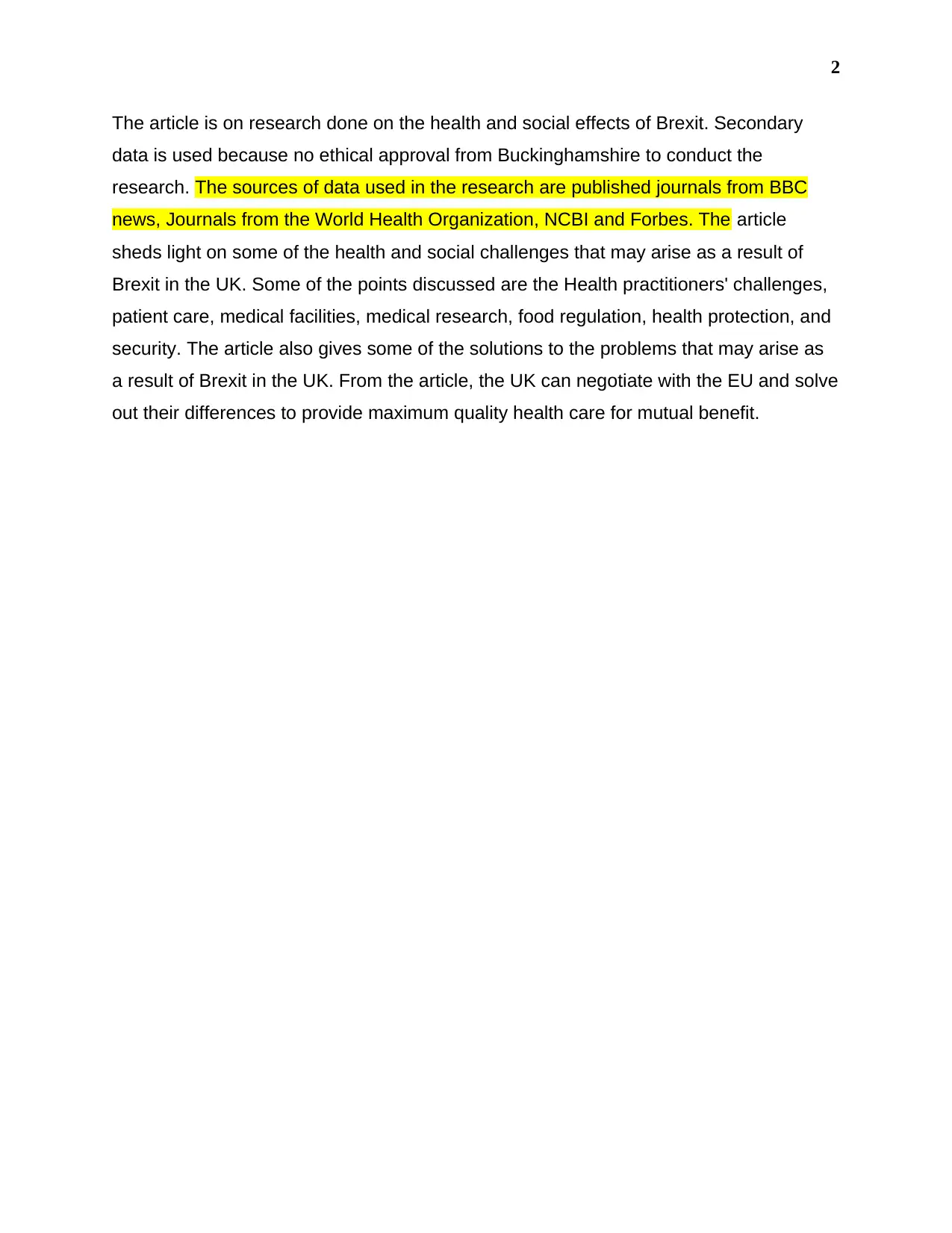
2
The article is on research done on the health and social effects of Brexit. Secondary
data is used because no ethical approval from Buckinghamshire to conduct the
research. The sources of data used in the research are published journals from BBC
news, Journals from the World Health Organization, NCBI and Forbes. The article
sheds light on some of the health and social challenges that may arise as a result of
Brexit in the UK. Some of the points discussed are the Health practitioners' challenges,
patient care, medical facilities, medical research, food regulation, health protection, and
security. The article also gives some of the solutions to the problems that may arise as
a result of Brexit in the UK. From the article, the UK can negotiate with the EU and solve
out their differences to provide maximum quality health care for mutual benefit.
The article is on research done on the health and social effects of Brexit. Secondary
data is used because no ethical approval from Buckinghamshire to conduct the
research. The sources of data used in the research are published journals from BBC
news, Journals from the World Health Organization, NCBI and Forbes. The article
sheds light on some of the health and social challenges that may arise as a result of
Brexit in the UK. Some of the points discussed are the Health practitioners' challenges,
patient care, medical facilities, medical research, food regulation, health protection, and
security. The article also gives some of the solutions to the problems that may arise as
a result of Brexit in the UK. From the article, the UK can negotiate with the EU and solve
out their differences to provide maximum quality health care for mutual benefit.
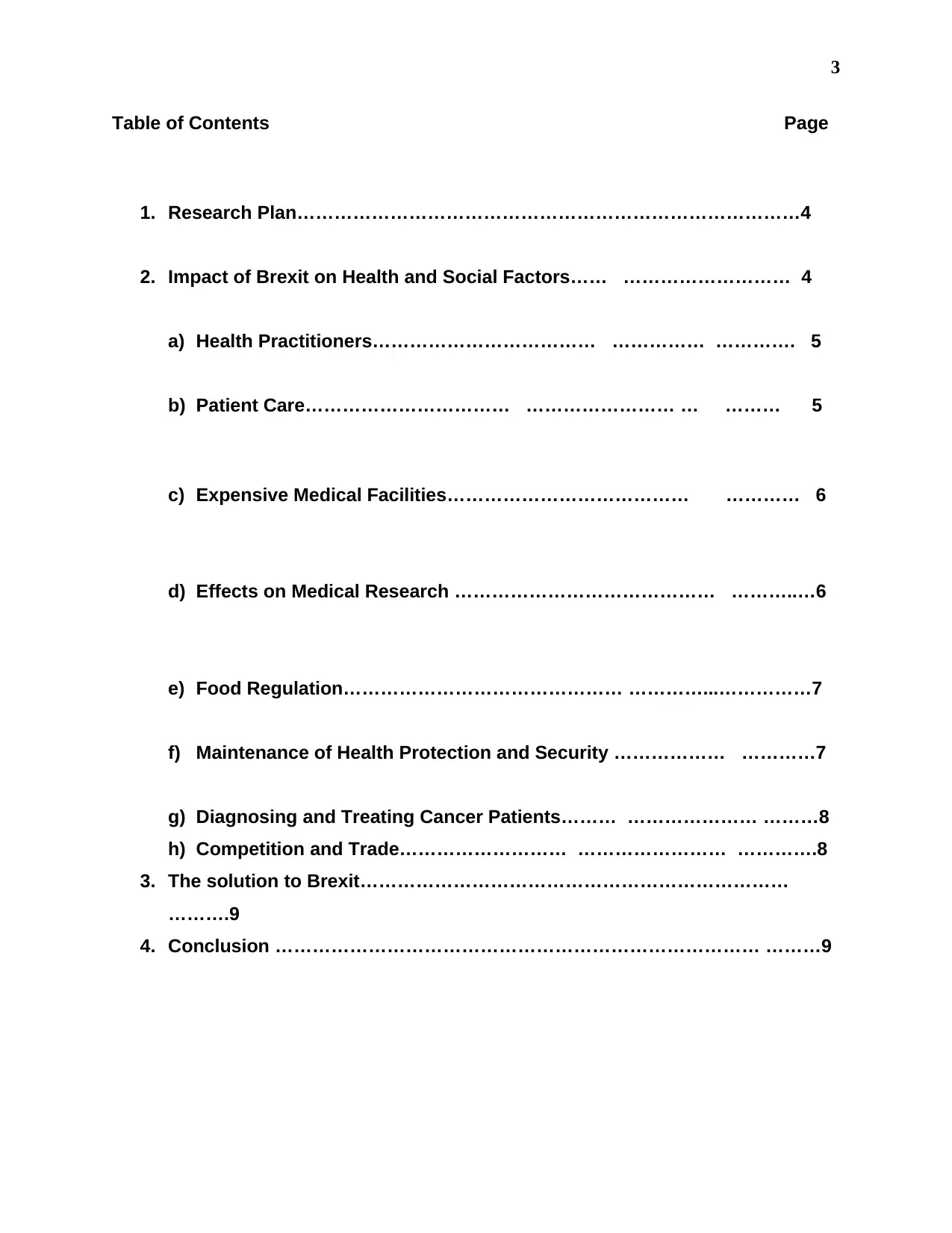
3
Table of Contents Page
1. Research Plan………………………………………………………………………4
2. Impact of Brexit on Health and Social Factors…… ……………………… 4
a) Health Practitioners……………………………… …………… …………. 5
b) Patient Care…………………………… …………………… … ……… 5
c) Expensive Medical Facilities………………………………… ………… 6
d) Effects on Medical Research …………………………………… ………..…6
e) Food Regulation……………………………………… …………...……………7
f) Maintenance of Health Protection and Security ……………… …………7
g) Diagnosing and Treating Cancer Patients……… ………………… ………8
h) Competition and Trade……………………… …………………… ………….8
3. The solution to Brexit……………………………………………………………
……….9
4. Conclusion …………………………………………………………………… ………9
Table of Contents Page
1. Research Plan………………………………………………………………………4
2. Impact of Brexit on Health and Social Factors…… ……………………… 4
a) Health Practitioners……………………………… …………… …………. 5
b) Patient Care…………………………… …………………… … ……… 5
c) Expensive Medical Facilities………………………………… ………… 6
d) Effects on Medical Research …………………………………… ………..…6
e) Food Regulation……………………………………… …………...……………7
f) Maintenance of Health Protection and Security ……………… …………7
g) Diagnosing and Treating Cancer Patients……… ………………… ………8
h) Competition and Trade……………………… …………………… ………….8
3. The solution to Brexit……………………………………………………………
……….9
4. Conclusion …………………………………………………………………… ………9
⊘ This is a preview!⊘
Do you want full access?
Subscribe today to unlock all pages.

Trusted by 1+ million students worldwide
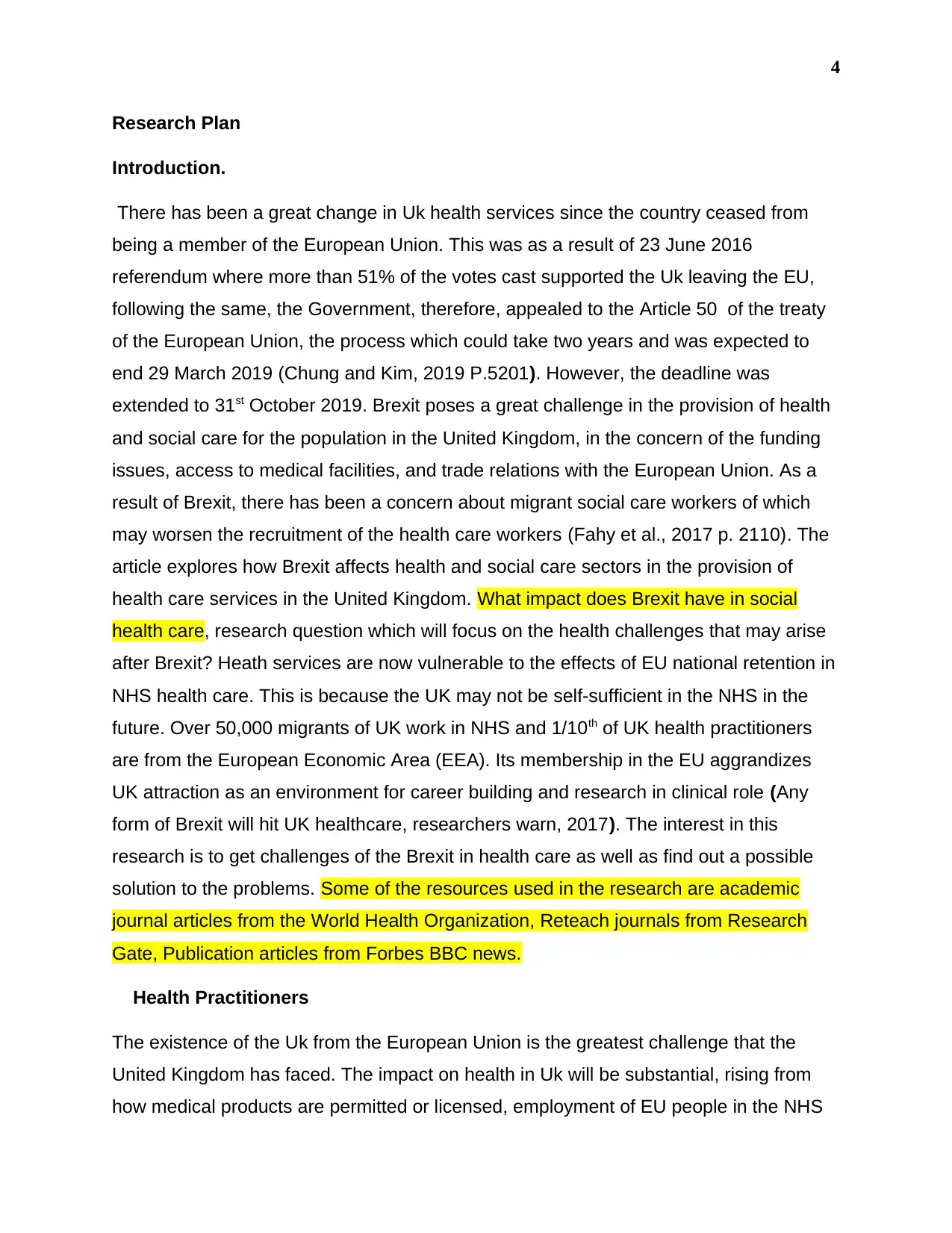
4
Research Plan
Introduction.
There has been a great change in Uk health services since the country ceased from
being a member of the European Union. This was as a result of 23 June 2016
referendum where more than 51% of the votes cast supported the Uk leaving the EU,
following the same, the Government, therefore, appealed to the Article 50 of the treaty
of the European Union, the process which could take two years and was expected to
end 29 March 2019 (Chung and Kim, 2019 P.5201). However, the deadline was
extended to 31st October 2019. Brexit poses a great challenge in the provision of health
and social care for the population in the United Kingdom, in the concern of the funding
issues, access to medical facilities, and trade relations with the European Union. As a
result of Brexit, there has been a concern about migrant social care workers of which
may worsen the recruitment of the health care workers (Fahy et al., 2017 p. 2110). The
article explores how Brexit affects health and social care sectors in the provision of
health care services in the United Kingdom. What impact does Brexit have in social
health care, research question which will focus on the health challenges that may arise
after Brexit? Heath services are now vulnerable to the effects of EU national retention in
NHS health care. This is because the UK may not be self-sufficient in the NHS in the
future. Over 50,000 migrants of UK work in NHS and 1/10th of UK health practitioners
are from the European Economic Area (EEA). Its membership in the EU aggrandizes
UK attraction as an environment for career building and research in clinical role (Any
form of Brexit will hit UK healthcare, researchers warn, 2017). The interest in this
research is to get challenges of the Brexit in health care as well as find out a possible
solution to the problems. Some of the resources used in the research are academic
journal articles from the World Health Organization, Reteach journals from Research
Gate, Publication articles from Forbes BBC news.
Health Practitioners
The existence of the Uk from the European Union is the greatest challenge that the
United Kingdom has faced. The impact on health in Uk will be substantial, rising from
how medical products are permitted or licensed, employment of EU people in the NHS
Research Plan
Introduction.
There has been a great change in Uk health services since the country ceased from
being a member of the European Union. This was as a result of 23 June 2016
referendum where more than 51% of the votes cast supported the Uk leaving the EU,
following the same, the Government, therefore, appealed to the Article 50 of the treaty
of the European Union, the process which could take two years and was expected to
end 29 March 2019 (Chung and Kim, 2019 P.5201). However, the deadline was
extended to 31st October 2019. Brexit poses a great challenge in the provision of health
and social care for the population in the United Kingdom, in the concern of the funding
issues, access to medical facilities, and trade relations with the European Union. As a
result of Brexit, there has been a concern about migrant social care workers of which
may worsen the recruitment of the health care workers (Fahy et al., 2017 p. 2110). The
article explores how Brexit affects health and social care sectors in the provision of
health care services in the United Kingdom. What impact does Brexit have in social
health care, research question which will focus on the health challenges that may arise
after Brexit? Heath services are now vulnerable to the effects of EU national retention in
NHS health care. This is because the UK may not be self-sufficient in the NHS in the
future. Over 50,000 migrants of UK work in NHS and 1/10th of UK health practitioners
are from the European Economic Area (EEA). Its membership in the EU aggrandizes
UK attraction as an environment for career building and research in clinical role (Any
form of Brexit will hit UK healthcare, researchers warn, 2017). The interest in this
research is to get challenges of the Brexit in health care as well as find out a possible
solution to the problems. Some of the resources used in the research are academic
journal articles from the World Health Organization, Reteach journals from Research
Gate, Publication articles from Forbes BBC news.
Health Practitioners
The existence of the Uk from the European Union is the greatest challenge that the
United Kingdom has faced. The impact on health in Uk will be substantial, rising from
how medical products are permitted or licensed, employment of EU people in the NHS
Paraphrase This Document
Need a fresh take? Get an instant paraphrase of this document with our AI Paraphraser
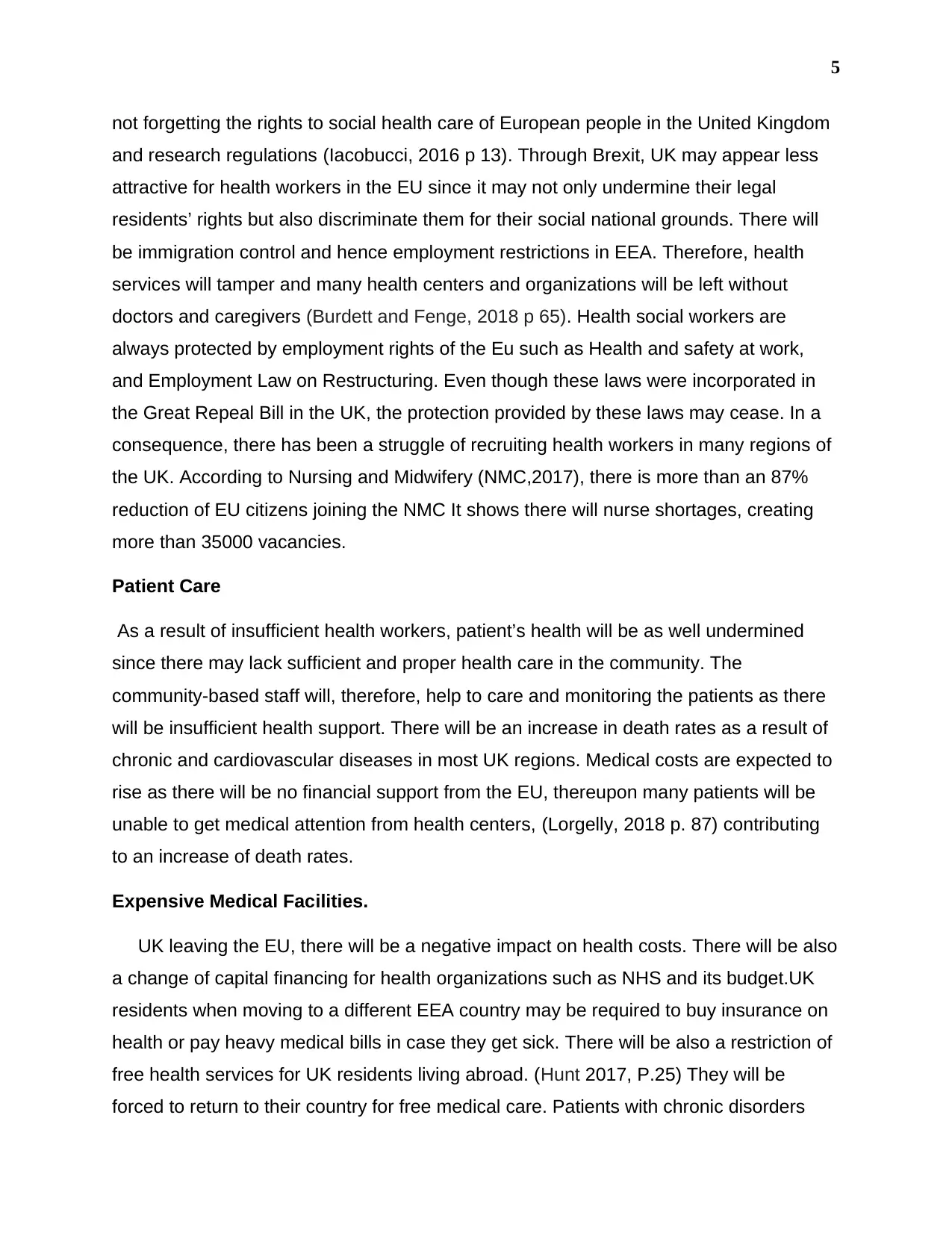
5
not forgetting the rights to social health care of European people in the United Kingdom
and research regulations (Iacobucci, 2016 p 13). Through Brexit, UK may appear less
attractive for health workers in the EU since it may not only undermine their legal
residents’ rights but also discriminate them for their social national grounds. There will
be immigration control and hence employment restrictions in EEA. Therefore, health
services will tamper and many health centers and organizations will be left without
doctors and caregivers (Burdett and Fenge, 2018 p 65). Health social workers are
always protected by employment rights of the Eu such as Health and safety at work,
and Employment Law on Restructuring. Even though these laws were incorporated in
the Great Repeal Bill in the UK, the protection provided by these laws may cease. In a
consequence, there has been a struggle of recruiting health workers in many regions of
the UK. According to Nursing and Midwifery (NMC,2017), there is more than an 87%
reduction of EU citizens joining the NMC It shows there will nurse shortages, creating
more than 35000 vacancies.
Patient Care
As a result of insufficient health workers, patient’s health will be as well undermined
since there may lack sufficient and proper health care in the community. The
community-based staff will, therefore, help to care and monitoring the patients as there
will be insufficient health support. There will be an increase in death rates as a result of
chronic and cardiovascular diseases in most UK regions. Medical costs are expected to
rise as there will be no financial support from the EU, thereupon many patients will be
unable to get medical attention from health centers, (Lorgelly, 2018 p. 87) contributing
to an increase of death rates.
Expensive Medical Facilities.
UK leaving the EU, there will be a negative impact on health costs. There will be also
a change of capital financing for health organizations such as NHS and its budget.UK
residents when moving to a different EEA country may be required to buy insurance on
health or pay heavy medical bills in case they get sick. There will be also a restriction of
free health services for UK residents living abroad. (Hunt 2017, P.25) They will be
forced to return to their country for free medical care. Patients with chronic disorders
not forgetting the rights to social health care of European people in the United Kingdom
and research regulations (Iacobucci, 2016 p 13). Through Brexit, UK may appear less
attractive for health workers in the EU since it may not only undermine their legal
residents’ rights but also discriminate them for their social national grounds. There will
be immigration control and hence employment restrictions in EEA. Therefore, health
services will tamper and many health centers and organizations will be left without
doctors and caregivers (Burdett and Fenge, 2018 p 65). Health social workers are
always protected by employment rights of the Eu such as Health and safety at work,
and Employment Law on Restructuring. Even though these laws were incorporated in
the Great Repeal Bill in the UK, the protection provided by these laws may cease. In a
consequence, there has been a struggle of recruiting health workers in many regions of
the UK. According to Nursing and Midwifery (NMC,2017), there is more than an 87%
reduction of EU citizens joining the NMC It shows there will nurse shortages, creating
more than 35000 vacancies.
Patient Care
As a result of insufficient health workers, patient’s health will be as well undermined
since there may lack sufficient and proper health care in the community. The
community-based staff will, therefore, help to care and monitoring the patients as there
will be insufficient health support. There will be an increase in death rates as a result of
chronic and cardiovascular diseases in most UK regions. Medical costs are expected to
rise as there will be no financial support from the EU, thereupon many patients will be
unable to get medical attention from health centers, (Lorgelly, 2018 p. 87) contributing
to an increase of death rates.
Expensive Medical Facilities.
UK leaving the EU, there will be a negative impact on health costs. There will be also
a change of capital financing for health organizations such as NHS and its budget.UK
residents when moving to a different EEA country may be required to buy insurance on
health or pay heavy medical bills in case they get sick. There will be also a restriction of
free health services for UK residents living abroad. (Hunt 2017, P.25) They will be
forced to return to their country for free medical care. Patients with chronic disorders
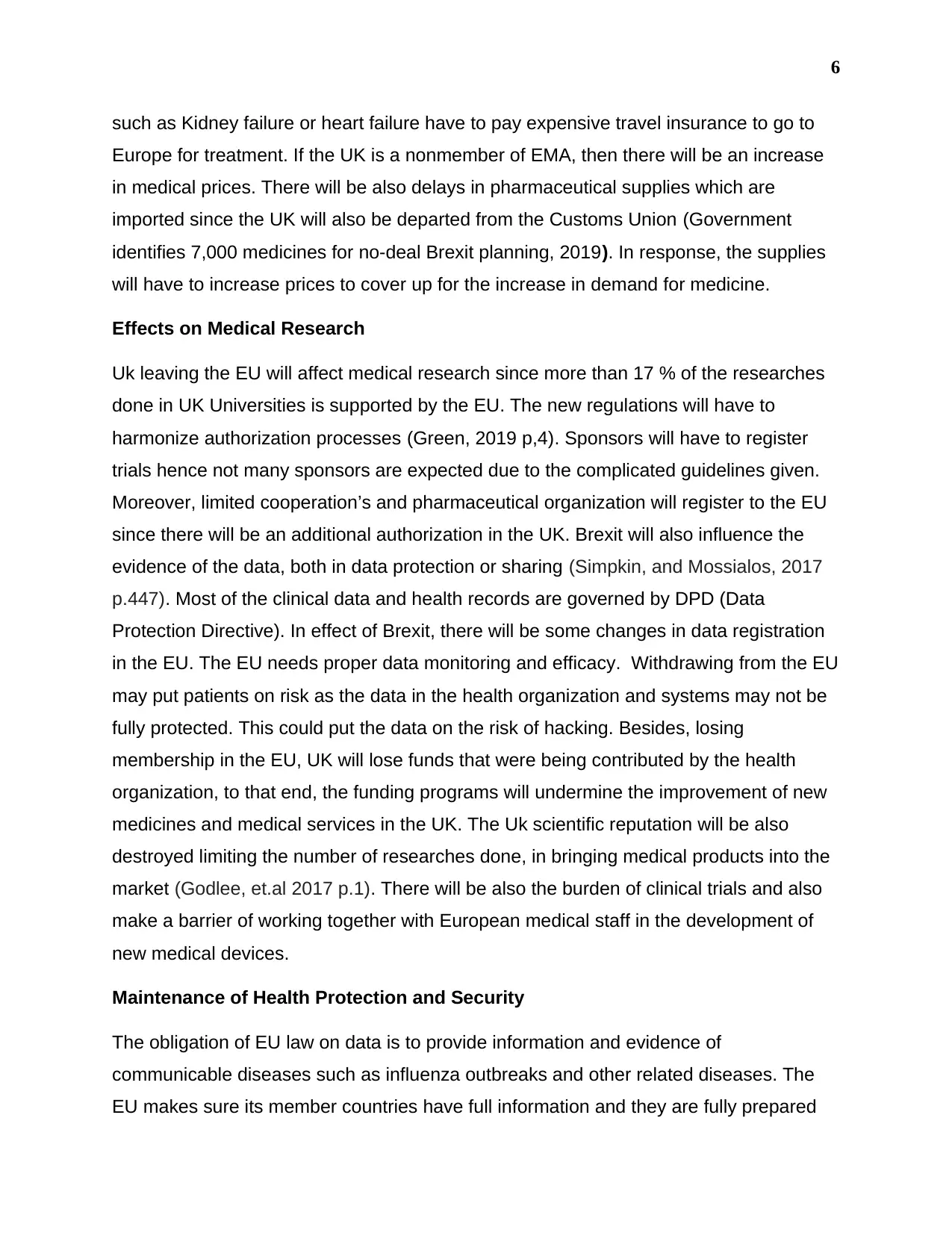
6
such as Kidney failure or heart failure have to pay expensive travel insurance to go to
Europe for treatment. If the UK is a nonmember of EMA, then there will be an increase
in medical prices. There will be also delays in pharmaceutical supplies which are
imported since the UK will also be departed from the Customs Union (Government
identifies 7,000 medicines for no-deal Brexit planning, 2019). In response, the supplies
will have to increase prices to cover up for the increase in demand for medicine.
Effects on Medical Research
Uk leaving the EU will affect medical research since more than 17 % of the researches
done in UK Universities is supported by the EU. The new regulations will have to
harmonize authorization processes (Green, 2019 p,4). Sponsors will have to register
trials hence not many sponsors are expected due to the complicated guidelines given.
Moreover, limited cooperation’s and pharmaceutical organization will register to the EU
since there will be an additional authorization in the UK. Brexit will also influence the
evidence of the data, both in data protection or sharing (Simpkin, and Mossialos, 2017
p.447). Most of the clinical data and health records are governed by DPD (Data
Protection Directive). In effect of Brexit, there will be some changes in data registration
in the EU. The EU needs proper data monitoring and efficacy. Withdrawing from the EU
may put patients on risk as the data in the health organization and systems may not be
fully protected. This could put the data on the risk of hacking. Besides, losing
membership in the EU, UK will lose funds that were being contributed by the health
organization, to that end, the funding programs will undermine the improvement of new
medicines and medical services in the UK. The Uk scientific reputation will be also
destroyed limiting the number of researches done, in bringing medical products into the
market (Godlee, et.al 2017 p.1). There will be also the burden of clinical trials and also
make a barrier of working together with European medical staff in the development of
new medical devices.
Maintenance of Health Protection and Security
The obligation of EU law on data is to provide information and evidence of
communicable diseases such as influenza outbreaks and other related diseases. The
EU makes sure its member countries have full information and they are fully prepared
such as Kidney failure or heart failure have to pay expensive travel insurance to go to
Europe for treatment. If the UK is a nonmember of EMA, then there will be an increase
in medical prices. There will be also delays in pharmaceutical supplies which are
imported since the UK will also be departed from the Customs Union (Government
identifies 7,000 medicines for no-deal Brexit planning, 2019). In response, the supplies
will have to increase prices to cover up for the increase in demand for medicine.
Effects on Medical Research
Uk leaving the EU will affect medical research since more than 17 % of the researches
done in UK Universities is supported by the EU. The new regulations will have to
harmonize authorization processes (Green, 2019 p,4). Sponsors will have to register
trials hence not many sponsors are expected due to the complicated guidelines given.
Moreover, limited cooperation’s and pharmaceutical organization will register to the EU
since there will be an additional authorization in the UK. Brexit will also influence the
evidence of the data, both in data protection or sharing (Simpkin, and Mossialos, 2017
p.447). Most of the clinical data and health records are governed by DPD (Data
Protection Directive). In effect of Brexit, there will be some changes in data registration
in the EU. The EU needs proper data monitoring and efficacy. Withdrawing from the EU
may put patients on risk as the data in the health organization and systems may not be
fully protected. This could put the data on the risk of hacking. Besides, losing
membership in the EU, UK will lose funds that were being contributed by the health
organization, to that end, the funding programs will undermine the improvement of new
medicines and medical services in the UK. The Uk scientific reputation will be also
destroyed limiting the number of researches done, in bringing medical products into the
market (Godlee, et.al 2017 p.1). There will be also the burden of clinical trials and also
make a barrier of working together with European medical staff in the development of
new medical devices.
Maintenance of Health Protection and Security
The obligation of EU law on data is to provide information and evidence of
communicable diseases such as influenza outbreaks and other related diseases. The
EU makes sure its member countries have full information and they are fully prepared
⊘ This is a preview!⊘
Do you want full access?
Subscribe today to unlock all pages.

Trusted by 1+ million students worldwide
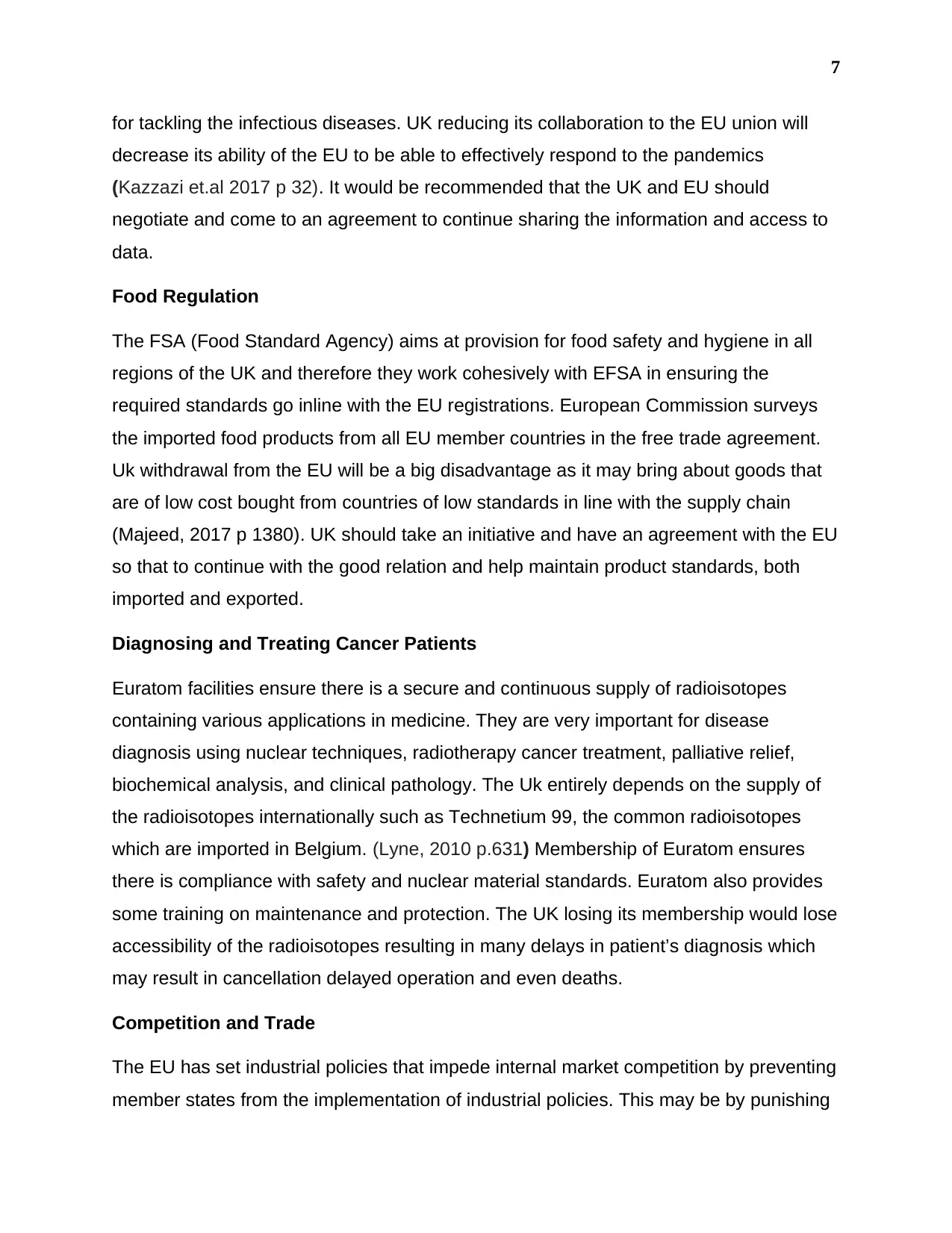
7
for tackling the infectious diseases. UK reducing its collaboration to the EU union will
decrease its ability of the EU to be able to effectively respond to the pandemics
(Kazzazi et.al 2017 p 32). It would be recommended that the UK and EU should
negotiate and come to an agreement to continue sharing the information and access to
data.
Food Regulation
The FSA (Food Standard Agency) aims at provision for food safety and hygiene in all
regions of the UK and therefore they work cohesively with EFSA in ensuring the
required standards go inline with the EU registrations. European Commission surveys
the imported food products from all EU member countries in the free trade agreement.
Uk withdrawal from the EU will be a big disadvantage as it may bring about goods that
are of low cost bought from countries of low standards in line with the supply chain
(Majeed, 2017 p 1380). UK should take an initiative and have an agreement with the EU
so that to continue with the good relation and help maintain product standards, both
imported and exported.
Diagnosing and Treating Cancer Patients
Euratom facilities ensure there is a secure and continuous supply of radioisotopes
containing various applications in medicine. They are very important for disease
diagnosis using nuclear techniques, radiotherapy cancer treatment, palliative relief,
biochemical analysis, and clinical pathology. The Uk entirely depends on the supply of
the radioisotopes internationally such as Technetium 99, the common radioisotopes
which are imported in Belgium. (Lyne, 2010 p.631) Membership of Euratom ensures
there is compliance with safety and nuclear material standards. Euratom also provides
some training on maintenance and protection. The UK losing its membership would lose
accessibility of the radioisotopes resulting in many delays in patient’s diagnosis which
may result in cancellation delayed operation and even deaths.
Competition and Trade
The EU has set industrial policies that impede internal market competition by preventing
member states from the implementation of industrial policies. This may be by punishing
for tackling the infectious diseases. UK reducing its collaboration to the EU union will
decrease its ability of the EU to be able to effectively respond to the pandemics
(Kazzazi et.al 2017 p 32). It would be recommended that the UK and EU should
negotiate and come to an agreement to continue sharing the information and access to
data.
Food Regulation
The FSA (Food Standard Agency) aims at provision for food safety and hygiene in all
regions of the UK and therefore they work cohesively with EFSA in ensuring the
required standards go inline with the EU registrations. European Commission surveys
the imported food products from all EU member countries in the free trade agreement.
Uk withdrawal from the EU will be a big disadvantage as it may bring about goods that
are of low cost bought from countries of low standards in line with the supply chain
(Majeed, 2017 p 1380). UK should take an initiative and have an agreement with the EU
so that to continue with the good relation and help maintain product standards, both
imported and exported.
Diagnosing and Treating Cancer Patients
Euratom facilities ensure there is a secure and continuous supply of radioisotopes
containing various applications in medicine. They are very important for disease
diagnosis using nuclear techniques, radiotherapy cancer treatment, palliative relief,
biochemical analysis, and clinical pathology. The Uk entirely depends on the supply of
the radioisotopes internationally such as Technetium 99, the common radioisotopes
which are imported in Belgium. (Lyne, 2010 p.631) Membership of Euratom ensures
there is compliance with safety and nuclear material standards. Euratom also provides
some training on maintenance and protection. The UK losing its membership would lose
accessibility of the radioisotopes resulting in many delays in patient’s diagnosis which
may result in cancellation delayed operation and even deaths.
Competition and Trade
The EU has set industrial policies that impede internal market competition by preventing
member states from the implementation of industrial policies. This may be by punishing
Paraphrase This Document
Need a fresh take? Get an instant paraphrase of this document with our AI Paraphraser
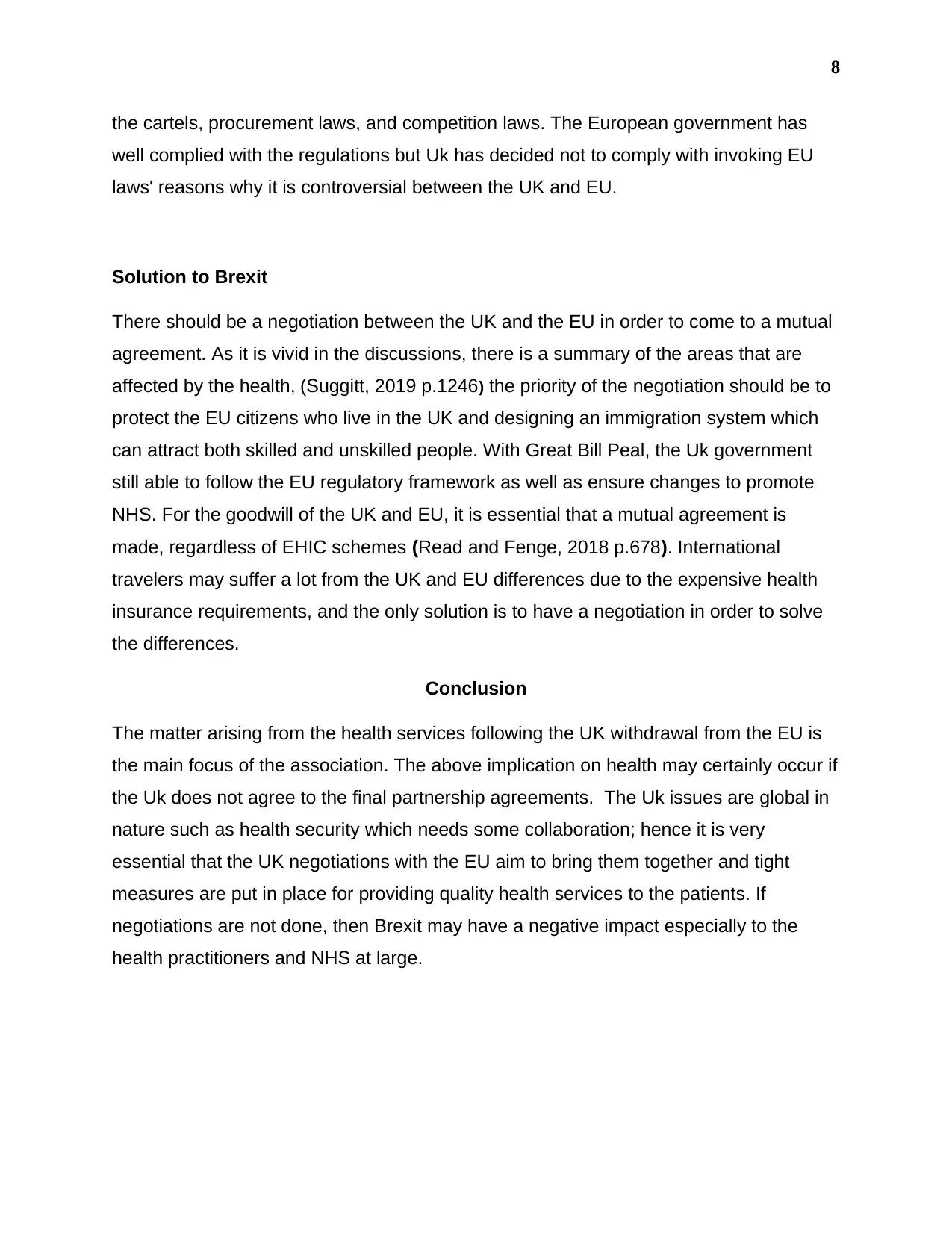
8
the cartels, procurement laws, and competition laws. The European government has
well complied with the regulations but Uk has decided not to comply with invoking EU
laws' reasons why it is controversial between the UK and EU.
Solution to Brexit
There should be a negotiation between the UK and the EU in order to come to a mutual
agreement. As it is vivid in the discussions, there is a summary of the areas that are
affected by the health, (Suggitt, 2019 p.1246) the priority of the negotiation should be to
protect the EU citizens who live in the UK and designing an immigration system which
can attract both skilled and unskilled people. With Great Bill Peal, the Uk government
still able to follow the EU regulatory framework as well as ensure changes to promote
NHS. For the goodwill of the UK and EU, it is essential that a mutual agreement is
made, regardless of EHIC schemes (Read and Fenge, 2018 p.678). International
travelers may suffer a lot from the UK and EU differences due to the expensive health
insurance requirements, and the only solution is to have a negotiation in order to solve
the differences.
Conclusion
The matter arising from the health services following the UK withdrawal from the EU is
the main focus of the association. The above implication on health may certainly occur if
the Uk does not agree to the final partnership agreements. The Uk issues are global in
nature such as health security which needs some collaboration; hence it is very
essential that the UK negotiations with the EU aim to bring them together and tight
measures are put in place for providing quality health services to the patients. If
negotiations are not done, then Brexit may have a negative impact especially to the
health practitioners and NHS at large.
the cartels, procurement laws, and competition laws. The European government has
well complied with the regulations but Uk has decided not to comply with invoking EU
laws' reasons why it is controversial between the UK and EU.
Solution to Brexit
There should be a negotiation between the UK and the EU in order to come to a mutual
agreement. As it is vivid in the discussions, there is a summary of the areas that are
affected by the health, (Suggitt, 2019 p.1246) the priority of the negotiation should be to
protect the EU citizens who live in the UK and designing an immigration system which
can attract both skilled and unskilled people. With Great Bill Peal, the Uk government
still able to follow the EU regulatory framework as well as ensure changes to promote
NHS. For the goodwill of the UK and EU, it is essential that a mutual agreement is
made, regardless of EHIC schemes (Read and Fenge, 2018 p.678). International
travelers may suffer a lot from the UK and EU differences due to the expensive health
insurance requirements, and the only solution is to have a negotiation in order to solve
the differences.
Conclusion
The matter arising from the health services following the UK withdrawal from the EU is
the main focus of the association. The above implication on health may certainly occur if
the Uk does not agree to the final partnership agreements. The Uk issues are global in
nature such as health security which needs some collaboration; hence it is very
essential that the UK negotiations with the EU aim to bring them together and tight
measures are put in place for providing quality health services to the patients. If
negotiations are not done, then Brexit may have a negative impact especially to the
health practitioners and NHS at large.
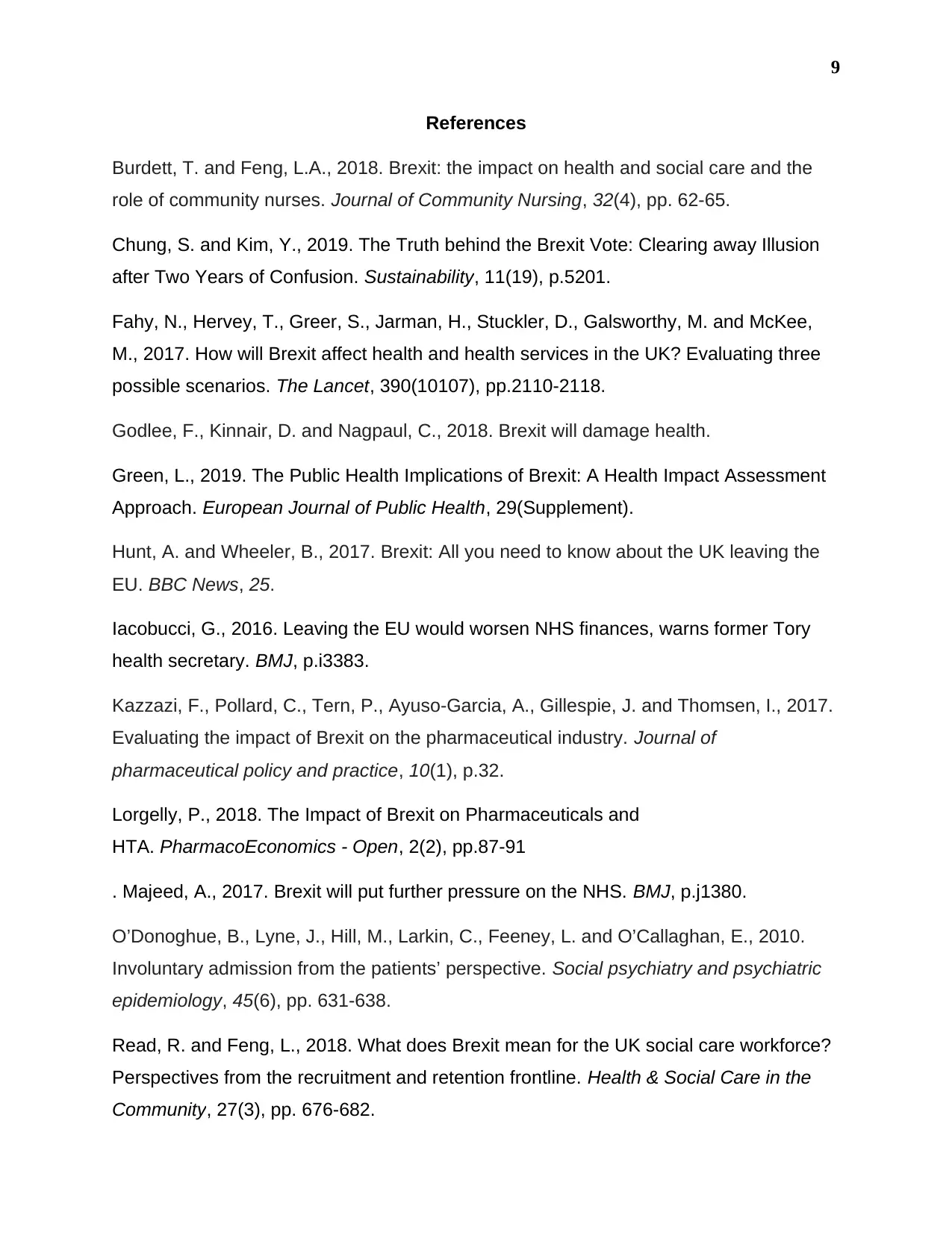
9
References
Burdett, T. and Feng, L.A., 2018. Brexit: the impact on health and social care and the
role of community nurses. Journal of Community Nursing, 32(4), pp. 62-65.
Chung, S. and Kim, Y., 2019. The Truth behind the Brexit Vote: Clearing away Illusion
after Two Years of Confusion. Sustainability, 11(19), p.5201.
Fahy, N., Hervey, T., Greer, S., Jarman, H., Stuckler, D., Galsworthy, M. and McKee,
M., 2017. How will Brexit affect health and health services in the UK? Evaluating three
possible scenarios. The Lancet, 390(10107), pp.2110-2118.
Godlee, F., Kinnair, D. and Nagpaul, C., 2018. Brexit will damage health.
Green, L., 2019. The Public Health Implications of Brexit: A Health Impact Assessment
Approach. European Journal of Public Health, 29(Supplement).
Hunt, A. and Wheeler, B., 2017. Brexit: All you need to know about the UK leaving the
EU. BBC News, 25.
Iacobucci, G., 2016. Leaving the EU would worsen NHS finances, warns former Tory
health secretary. BMJ, p.i3383.
Kazzazi, F., Pollard, C., Tern, P., Ayuso-Garcia, A., Gillespie, J. and Thomsen, I., 2017.
Evaluating the impact of Brexit on the pharmaceutical industry. Journal of
pharmaceutical policy and practice, 10(1), p.32.
Lorgelly, P., 2018. The Impact of Brexit on Pharmaceuticals and
HTA. PharmacoEconomics - Open, 2(2), pp.87-91
. Majeed, A., 2017. Brexit will put further pressure on the NHS. BMJ, p.j1380.
O’Donoghue, B., Lyne, J., Hill, M., Larkin, C., Feeney, L. and O’Callaghan, E., 2010.
Involuntary admission from the patients’ perspective. Social psychiatry and psychiatric
epidemiology, 45(6), pp. 631-638.
Read, R. and Feng, L., 2018. What does Brexit mean for the UK social care workforce?
Perspectives from the recruitment and retention frontline. Health & Social Care in the
Community, 27(3), pp. 676-682.
References
Burdett, T. and Feng, L.A., 2018. Brexit: the impact on health and social care and the
role of community nurses. Journal of Community Nursing, 32(4), pp. 62-65.
Chung, S. and Kim, Y., 2019. The Truth behind the Brexit Vote: Clearing away Illusion
after Two Years of Confusion. Sustainability, 11(19), p.5201.
Fahy, N., Hervey, T., Greer, S., Jarman, H., Stuckler, D., Galsworthy, M. and McKee,
M., 2017. How will Brexit affect health and health services in the UK? Evaluating three
possible scenarios. The Lancet, 390(10107), pp.2110-2118.
Godlee, F., Kinnair, D. and Nagpaul, C., 2018. Brexit will damage health.
Green, L., 2019. The Public Health Implications of Brexit: A Health Impact Assessment
Approach. European Journal of Public Health, 29(Supplement).
Hunt, A. and Wheeler, B., 2017. Brexit: All you need to know about the UK leaving the
EU. BBC News, 25.
Iacobucci, G., 2016. Leaving the EU would worsen NHS finances, warns former Tory
health secretary. BMJ, p.i3383.
Kazzazi, F., Pollard, C., Tern, P., Ayuso-Garcia, A., Gillespie, J. and Thomsen, I., 2017.
Evaluating the impact of Brexit on the pharmaceutical industry. Journal of
pharmaceutical policy and practice, 10(1), p.32.
Lorgelly, P., 2018. The Impact of Brexit on Pharmaceuticals and
HTA. PharmacoEconomics - Open, 2(2), pp.87-91
. Majeed, A., 2017. Brexit will put further pressure on the NHS. BMJ, p.j1380.
O’Donoghue, B., Lyne, J., Hill, M., Larkin, C., Feeney, L. and O’Callaghan, E., 2010.
Involuntary admission from the patients’ perspective. Social psychiatry and psychiatric
epidemiology, 45(6), pp. 631-638.
Read, R. and Feng, L., 2018. What does Brexit mean for the UK social care workforce?
Perspectives from the recruitment and retention frontline. Health & Social Care in the
Community, 27(3), pp. 676-682.
⊘ This is a preview!⊘
Do you want full access?
Subscribe today to unlock all pages.

Trusted by 1+ million students worldwide
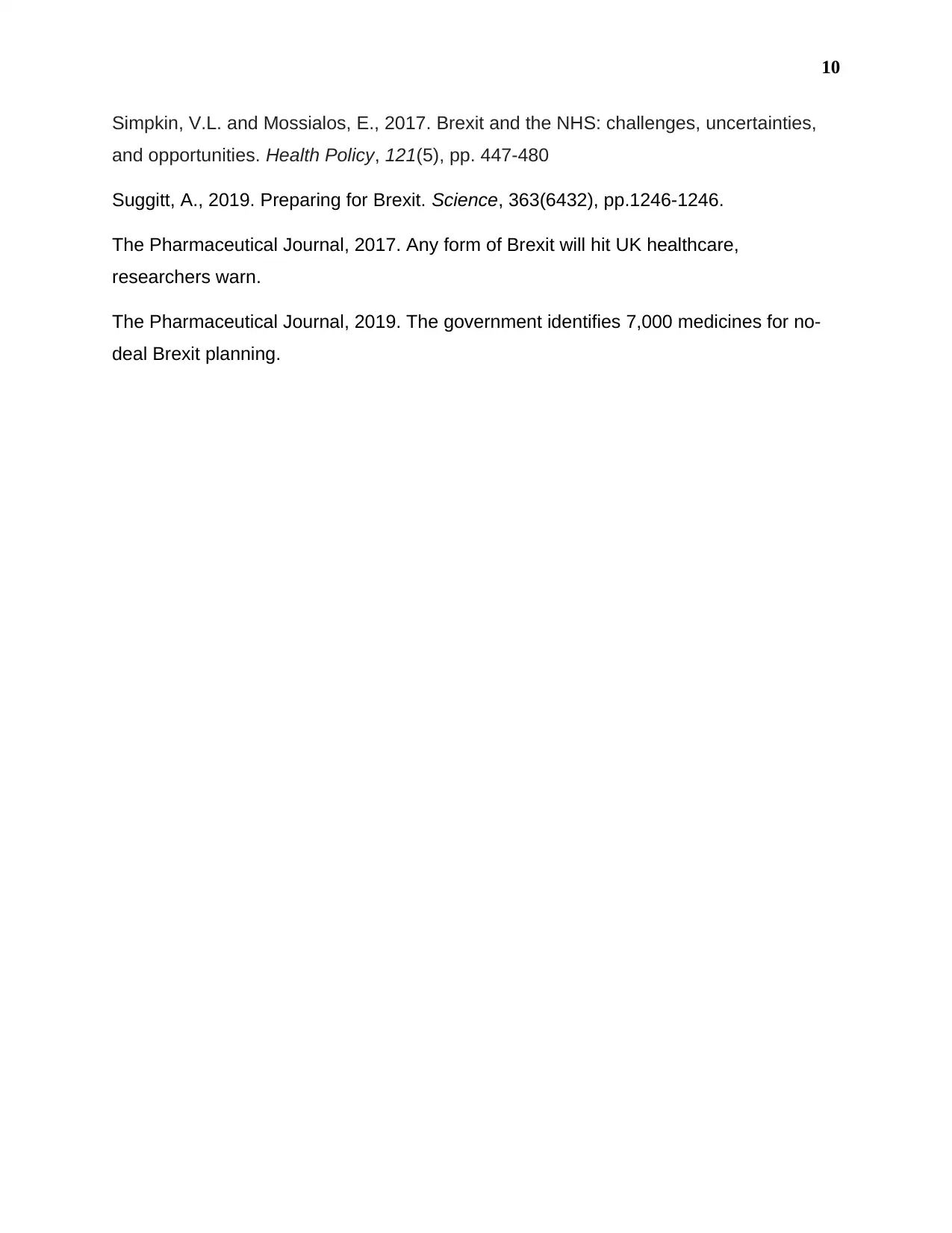
10
Simpkin, V.L. and Mossialos, E., 2017. Brexit and the NHS: challenges, uncertainties,
and opportunities. Health Policy, 121(5), pp. 447-480
Suggitt, A., 2019. Preparing for Brexit. Science, 363(6432), pp.1246-1246.
The Pharmaceutical Journal, 2017. Any form of Brexit will hit UK healthcare,
researchers warn.
The Pharmaceutical Journal, 2019. The government identifies 7,000 medicines for no-
deal Brexit planning.
Simpkin, V.L. and Mossialos, E., 2017. Brexit and the NHS: challenges, uncertainties,
and opportunities. Health Policy, 121(5), pp. 447-480
Suggitt, A., 2019. Preparing for Brexit. Science, 363(6432), pp.1246-1246.
The Pharmaceutical Journal, 2017. Any form of Brexit will hit UK healthcare,
researchers warn.
The Pharmaceutical Journal, 2019. The government identifies 7,000 medicines for no-
deal Brexit planning.
1 out of 10
Related Documents
Your All-in-One AI-Powered Toolkit for Academic Success.
+13062052269
info@desklib.com
Available 24*7 on WhatsApp / Email
![[object Object]](/_next/static/media/star-bottom.7253800d.svg)
Unlock your academic potential
Copyright © 2020–2026 A2Z Services. All Rights Reserved. Developed and managed by ZUCOL.





